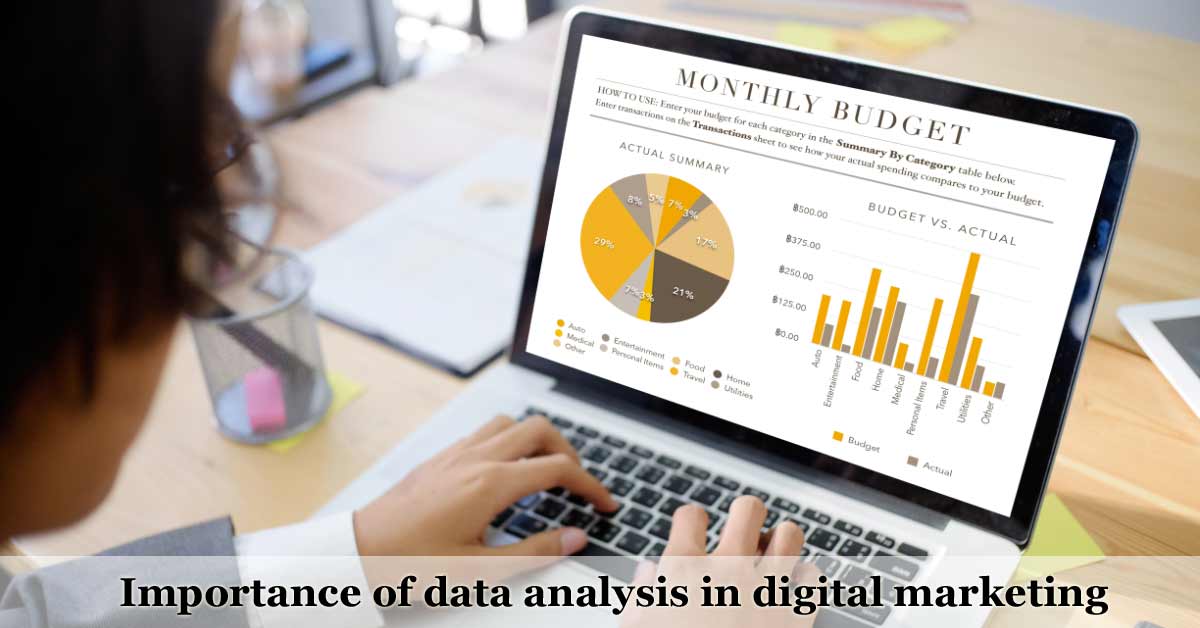The Critical Role of Data Analysis in Digital Marketing
Digital marketing relies heavily on data. With more business conducted online now than ever before, companies must analyze customer data to deliver targeted, relevant messaging that drives conversions. Simply put, data analysis is crucial for successful digital marketing campaigns. In this article, we’ll explore why it’s so vital and how you can use it to boost results.
The Value of Data in Digital Marketing
Data plays several key roles in digital marketing:
- Understanding Your Audience
With data analysis, you gain valuable audience insights around demographics, behaviors, needs, and more. These details allow you to segment your customers and serve each group with tailored messaging. Data enables refined targeting to inspire the desired actions from each audience subset. - Optimizing Campaigns
You need performance metrics to optimize campaigns. By studying analytics around traffic sources, conversions, costs per lead/sale and beyond, you can double down on high-performing initiatives and revamp poor performers. Continual optimization is how top digital marketers improve results over time. - Spotting Trends and Opportunities
Looking at historical trends equips you to predict future needs. You can use tools like Google Trends to reveal rising queries and interest shifts. With smart data analysis, you’ll notice changing tides first to capitalize on new opportunities. - Gauging Campaign Success
How do you know if a campaign hit the mark? Data provides the answers. By comparing metrics pre and post-launch, you see the direct impact. Lift in traffic, subscribers, sales, and other KPIs indicate how well each campaign achieved its goal. These insights guide future initiative planning and budget allocation. - Enhancing Personalization
Today’s savvy buyers expect personalized interactions. Data analysis enables this by revealing customer preferences, common attributes, past purchases, page views, and more. With these details, you can fine-tune messaging to cater to each visitor. Dynamic content and smarter product recommendations drive greater conversions.
Key Data Points for Digital Marketers
Now that you see the integral role data plays, what specific metrics should you track for smarter direction? Here are 5 key focal points:
- Traffic data shows how many visitors you attract plus sources, top pages, locations and more helpful context. Trend this over time to spot opportunities.
- Lead and customer details illustrate pipeline momentum and conversion rates. Also analyze demographic data to refine targeting.
- Engagement metrics like clickthrough, time on site, pages per visit reveal content resonance. These help guide topic and format choices.
- Conversions by campaign and channel enable you to double down where traction takes hold. Identify what content and offers convince visitors to convert.
- ROIDerived from campaign costs and revenue, ROI pinpoints paid initiatives delivering the highest returns. Let ROI guide your digital ad budget allocation.
Best Practices for Leveraging Data
Hopefully by now you recognize the immense value of dedicating time and resources to serious data analysis. To help you maximize the benefits, here are 3 proven best practices:
- Invest in analytics software. Robust tools like Google Analytics make accessing, organizing and reporting data much easier. The right market stack clarifies rather than complicates things.
- Build internal data expertise. Hire analysts or train current marketers on mining insights from analytics. Making data a core competency across your digital team enables better decisions.
- Create standardized reports. Document the metrics that matter most to stay on top of them. Consistently analyze reports to spot any fluctuations and take swift action.
When to Enlist Outside Support
For small teams with limited bandwidth, consider enlisting help to extract meaningful insights from all that data. Experienced analysts dive deep to uncover trends you may otherwise miss. Just define the key questions you need answered. Their findings help steer impactful decisions on audience targeting, messaging, lead nurturing and much more.
The Takeaway
In digital marketing today, data is king. Applying analytics provides the very fuel for your initiatives. Helpful dashboards and reporting bring key metrics to the forefront for consistent review. And enlisting analytical experts unlocks deeper-level insights from all that valuable data. Prioritize these best practices to get the most from your digital marketing analytics. With smart analysis powering data-driven decisions, your next campaigns will delight.
Understanding Your Target Audience Through Data
Having a keen understanding of who you are trying to reach and influence is foundational to digital marketing success. Audiences have changed radically in recent years. Buyer preferences, attitudes and behaviors continue advancing at warp speed in the digital era. This heightens the need for continual audience research through data analytics.
With analytics, you can segment customers based on attributes like demographics, geographic location, job role, past purchases and more. Behavioral details help further fine-tune targeting. Savvy digital marketers analyze data to identify customer personas then map out tailored nurturing journeys to convert each one.

Using Data to Spot Trends and Seize Opportunities
The mercurial nature of digital commerce makes it mandatory for brands to stay on top of trends. Leveraging data analytics positions you to spot rising opportunities first. For example, breakout search queries may signal shifting consumer interests. Analyzing historical trends around seasonality, economic factors and previous campaigns also gives useful context for planning initiatives.
Tool sets like Google Trends make tracking specific keyword and consumer trends simple. You gain visibility into growing or waning search volumes. More niche long-tail keywords often offer a less competitive way to intercept demand. This data can directly inform blog and social media content planning too.
Let Data Analysis Optimize Your Digital Campaigns
The beauty of digital marketing lies in the ability to continually optimize based on solid data. Analytics empower you to monitor aspects like:
- Traffic quality and volumes from each lead source
- Clickthrough rates on calls-to-action
- Conversions by audience segment and campaign
- Engagement metrics around email open and click rates
- Form completion rates
- ROI across paid initiatives
Identify poor performing areas prompting action to improve. At the same time, spotlight high-traction pathways to double down on what works. Continual optimization through data-backed decisions lets you inch conversion rates higher over time.
Use Historical Data to Guide Future Initiatives
Progress often means looking back while forging ahead. Historical campaign and traffic data guide sound future decisions. Baseline metrics to watch include:
- Traffic surges around holidays, promotions and current events
- Conversions by geo and demographic
- ROI levels from each lead source and campaign
Compare new efforts to past iterations evaluating what resonated best with each target persona. Continuity in analyzing key performance indicators spotlight program momentum. Data indicating drops or lags also urge a closer look at recent changes. Ongoing optimization relies on having this historical view to chart improvement.
Conclusion
In our digitally-driven business landscape, data is indispensable to marketing success. Smart analysis around audience interests, behaviors and channel preferences enable refined targeting. Campaign data reveals optimization opportunities for continual improvement. Analytics help you spot emerging trends early and capitalize on shifts. Across the board, leveraging data and enlisting expert support empowers impactful decisions. Ultimately with analytics as an ally, your digital marketing hits the bullseye. Data Helps Drive Better Decisions.

